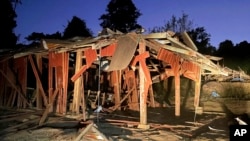This year, “countless civilians continue to be caught in situations of conflict, violence and human rights violations which may amount to genocide, war crimes, crimes against humanity and ethnic cleansing,” according to a recent United Nations report. “The daily toll of targeted and intentional mass murder, forced displacement and other untold suffering continues to hang heavily over our common humanity.”
On the heels of atrocities committed during the 1990s in the Balkans and in Rwanda, and the perceived failure of the international community to prevent them, it became clear that a chain of responsibility for protecting civilians from atrocities must be established. In 2005, the United Nations adopted the Responsibility to Protect document, which stipulates that states have an obligation to protect their citizens from mass atrocity crimes, and if they can’t, the international community must step in.
“Despite these efforts, we continue to see the perpetration of atrocities in numerous situations around the world,” said Jonathan Shrier, United States Deputy Representative to the UN Economic and Social Council. “We must focus our attention and efforts on addressing atrocities that are taking place across the world.”
The sad fact is that there are too many incidents to name. However, some stand out by their sheer heinousness and ugliness. In Ukraine, the destruction of the Kakhovka hydroelectric dam caused a major humanitarian and environmental disaster. Likewise, Russian bomb, missile and drone attacks on Ukrainian cities caused thousands of deaths even as they specifically targeted for destruction, critical civilian infrastructure including schools, hospitals, and commercial centers.
In Burma, the violence and oppression of the military has perpetuated a humanitarian crisis.
From Sudan, and West Darfur in particular, come reports of horrific sexual violence and killings based on ethnicity.
And in China, “authorities continue to commit genocide and crimes against humanity against predominantly Muslim Uyghurs and members of other ethnic and religious minority groups in Xinjiang,” said Ambassador Shrier.
“These acts are flagrant violations of international humanitarian law. All parties to armed conflict must immediately end such practices. All States and armed groups must comply with their obligations under international humanitarian law and should implement good practices to mitigate and respond to harm to civilians and civilian objects,” he said.
“The United States remains committed to upholding its obligations regarding the protection of civilians and to promoting accountability for those who are responsible for atrocities.”














